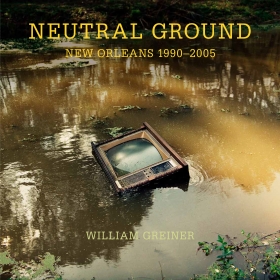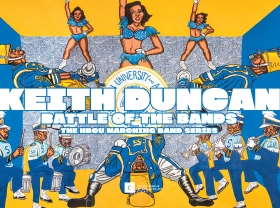
Seeing Black
Description
Situating historical inquiry alongside contemporary practices of Black image-making in New Orleans, SEEING BLACK: Black Photography in New Orleans 1840 and Beyond engages the photographic grammars, textures, multiplicities, and visual sounds of Black life in and outside the city.
SEEING BLACK features over two hundred images by nearly ninety Black photographers whose work embraces the camera's visual power—discerning, beholding, and documenting people, places, events, collective memories, encounters, and ever-present moments of blackness. From the invisible to the obvious, the mundane to the spectacular, the overlooked to the seen, the erased to the remembered, the artists explore a range of photographic frequencies, styles, and rhythmic scores. SEEING BLACK invites us to explore historical and contemporary archives of Black life while challenging dominant viewing practices, asking who is taking the picture, who is in or missing from the frame, and how to shift our interactions with the visual image through an intentionally embodied Black gaze.
Author Bio
Kalamu ya Salaam (b. 1947, New Orleans) is a writer, activist, social critic, filmmaker, and retired educator. His work is widely anthologized and exists within the Black Arts Movement and its ongoing legacy. Salaam is the author of seven books of poetry, including The Blues Merchant Songs for Blkfolk (1969), What is Life? Reclaiming the Black Blues Self (1994), Be About Beauty, which won the PEN Oakland/Josephine Miles Literary Award in 2019, Cosmic Deputy (2021), a fifty-year retrospective of poetry, and Precise Tenderness: 100 Haiku (2023); two collections of essays, including Magic of Juju: An Appreciation of the Black Arts Movement (1998); a collection of prose, In Love and Struggle (2023); and thirteen plays. He is editor and co-editor of six anthologies, including New Orleans Griot: The Tom Dent Reader (2018), which was the One Book One New Orleans city-wide read selection for 2020.
Shana M. griffin (b. 1974, New Orleans) is a feminist activist, independent researcher, sociologist, abolitionist, geographer, and artist. griffin's practice is interdisciplinary, research-based, and decolonial—attending to the particular experiences of Black women most vulnerable to the violence of poverty, incarceration, polluted environments, reproductive regulation, economic exploitation, housing discrimination, and climate change. Her work exists across the fields of sociology, geography, Black feminist thought, and land-use planning, and within movements challenging urban displacement, carcerality, reproductive control, climate impacts, and gender-based violence. griffin is the recipient of several awards, including a 2025 Loeb Fellowship and Loeb/ArtLab Fellowship, a 2022 Andy Warhol Curatorial Research Fellowship, and the 2021 Creative Capital Award. She holds a Master of Arts in Sociology, a Bachelor of Arts in History, and a Bachelor of Arts in Sociology.
Eric Waters is a photographer and social practice artist who has been documenting Black social life and cultural traditions in and around New Orleans for over forty years. Waters received his undergraduate degree from Dillard University and studied photography independently under the tutelage of the late Marion J. Porter, a well-known and respected Black New Orleans photographer. His work encompasses a broad range of interests and has been exhibited nationally and internationally, including at the New Orleans Museum of Art, the New Orleans African American Museum, the New Orleans Jazz Museum at the Old US Mint, the Contemporary Art Center, New Orleans, and Ashé Cultural Arts Center. A 2019 Joan Mitchell Foundation Artist-in-Residence, his work has been featured in numerous catalogs and books, including a catalog of his work in Freedom's Dance: Social Aid and Pleasure Clubs in New Orleans (2018), narrated by Karen Celestan.





